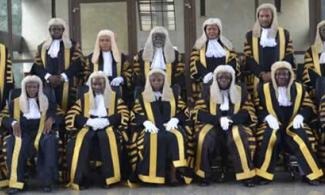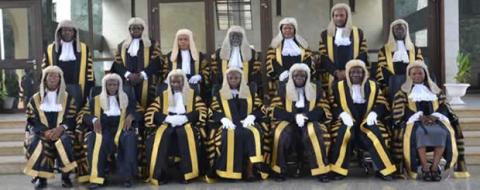
Whilst hard work and opportunities are favoured by some people, there are other people who use their positions, connections and skills to acquire wealth illegally and in criminal ways.

There was a time, and it was not too long ago, when in many communities the name or job of a parent qualifies a child for kindness or disdain.
In the of qualification-by-association mindset, if one’s father or mother was a school teacher, the child was seen as disciplined and dilligent. The offspring of a well-educated person would get abundant respect. Similarly respected were the offspring of honest, reputable, hardworking folks.
Some professions also bestowed respect and admiration on their practitioners. The legal profession was highly considered. And within the legal fraternity, a magistrate was the first step into the dignified chamber of justice. As one went higher in the judiciary, the higher was the adoration too.
A judge was a special being, above many others. If a judge wore only golden shoes in people’s imagination, a justice of the Supreme Court wore only diamond dresses and they would walk only with angels– still in people’s imagination. It used to be rare for people to meet justices of the Supreme Court anywhere other than at the Supreme Court, or at dignifying national official events.
Suddenly the cookies have been crumbling. Judges’ homes have been raided and searched for stolen wealth. Judges were accused of selling their golden stools for a bagful of Naira and various currencies. And not a few have been tried, sanctioned or dismissed over the years.
The sad story started a while back. The search for wealth and the need for money is pursued by people in various ways. Whilst hard work and opportunities are favoured by some people, there are other people who use their positions, connections and skills to acquire wealth illegally and in criminal ways. The combination of politics as quick-investment-for-quick-returns, importance of personal material well-being and general loss of honesty and ethical values in the society aided amplification of abuse within the legal profession and judiciary.
In an interview in November 2016, Mr. Olayinka Ayoola, former Supreme Court Justice, expressed regrets at the arrest of some judges by agents of Department of Security Services at the time. He foretold that the implication “was too serious to be quantified now”. The former Chief Justice of The Gambia, said it was debasing for judges to be accused of corruption. “Nothing should tempt a judge to seek or collect a bribe,” Justice Ayoola said.
He disclosed that he had never received bribe because nobody ever approached him to offer a bribe. “I feel …that I never had the opportunity of rejecting bribe because nobody has ever approached me throughout my career as a judge, here in Nigeria or elsewhere.”
In the current situation, the quote above seems like coming from a long gone era. The unheard of has happened. A few weeks ago, then Chief Justice of Nigeria, Mr. Walter Onnoghen, faced serious allegations of misdeeds, and was tried both in the public arena and in judicial institutions. He resigned in a cloudy gloom of dirt that should not have been associated ever with the exalted office, nor with his name.
In a widely quoted story, US Supreme Court Justice Oliver Wendell Holmes (1841-1935) was traveling by train to Washington, D.C., and a conductor came to check his ticket. Justice Holmes searched everywhere for it but could not locate the ticket. The conductor merely said, “Don’t worry about your ticket, Mr. Holmes. We all know who you are. When you get to your destination, you can find it and just mail it to us.”
Unfortunately, the distinguished positive characteristics and consideration for judges do not appear merited in Nigeria any longer. It is perhaps due to the actions of a few, but the negative implications are far-reaching.
The judiciary has not collapsed yet. There are, like in any group of people or profession, judges who cringe at the injustice that some of their colleagues have done to the judiciary. There are judges who live a life of dignity and respect with full understanding and acceptance of their responsibility. They refuse to be seen in the marketplace of financial misdeeds and abuse of office. There amongst them lie the saviours. They must protect their oath of office against the bad eggs, no matter how difficult or challenging it is, at this crucial time.
They must refuse to be bought by politicians who will only pay, use and dump them.
During and after elections, hundreds of cases come before the various courts and tribunals for decisions. Ours is a do-or-die political climate where very large monies are spent to purchase nomination at party primaries, and to buy votes and win elections. It is the same logic that drives politicians to spend huge amounts of money to corrupt justice, seeking out possible judges at any price to be bought.
Mr. John Marshall (1755-1835) USA Chief Justice of the Supreme Court, and remembered as perhaps the most influential justices of all time in the country, made pronouncements and rulings that permanently uplifted the judiciary to its rightful place as an equal part of the three layered branch with the executive and the legislature. History remembers him.
When retiring from the Supreme Court in 2007, Justice Modibo Alfa Belgore appealed to the legislators: “All elected officers are entrusted by the electors with the sacred responsibility of governing well and making laws for good governance so that there will be law and order in the nation…There is absolute nothing wrong with the constitution if the operators manifest loyalty to the nation.” He had made an important ruling at the Supreme Court against the illegal impeachment of a governor who he ordered to be reinstated after the governor had lost his cases at the lower courts.
There are many cases currently where pronouncements of courts and tribunals will mar or make the judiciary. In the states, from Ekiti to Oshun, from Rivers to Imo, and from Kano to Zamfara, the reasoned arguments of our judges and logical conclusions can strengthen the faith of the people in the judiciary and the country.
Hear Justice Chukwudifu Oputa, fondly referred to as ‘The Socrates of Supreme Court’: “If you are a judge and you are corrupt, where do we go from here? Then everything has come to a halt. If the legislature is corrupt, you go to the judiciary for redress. If the executive is corrupt you go to the judiciary for remedy. If the judiciary itself is corrupt, where do you go from there?”
Judges should rise up to the highest standards expected of their positions and affirm the famous saying – the judiciary is the last hope of the common man.
Makinwa is the CEO of AUNIQUEI Communication for Leadership.